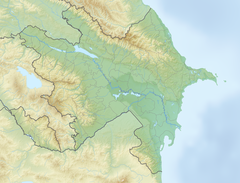Shamakhi Astrophysical Observatory
 Panoramic view of the Shamakhi Astrophysical Observatory | |||||||||
| Alternative names | Shamakhi Astrophysical Observatory | ||||||||
|---|---|---|---|---|---|---|---|---|---|
| Named after | Nasir al-Din al-Tusi | ||||||||
| Organization | Azerbaijan National Academy of Sciences | ||||||||
| Location | Pirqulu, Azerbaijan | ||||||||
| Coordinates | 40°46′55″N 48°35′48″E / 40.78194°N 48.59667°E | ||||||||
| Altitude | 1,500, 1,435 m (4,921, 4,708 ft) | ||||||||
| Observing time | 200 nights per year | ||||||||
| Established | January 13, 1960 | ||||||||
| Website | Shao.az | ||||||||
| Telescopes | |||||||||
| |||||||||
Shamakhi Astrophysical Observatory (Azerbaijani: Nəsirəddin Tusi adına Şamaxı Astrofizika Rəsədxanası) is an astronomical observatory in the Greater Caucasus Mountains in Shamakhi Rayon in Azerbaijan. The observatory is one of the biggest in the South Caucasus. It is named after the medieval Persian astronomer Nasir al-Din al-Tusi. It is owned and operated by the Azerbaijan National Academy of Sciences.
It was built between 1958-1960 during the Soviet era as the main observing site for the Azerbaijan National Academy of Sciences which is located 144 km (89 mi) away in Baku. The observatory is about 22 km (14 mi) northwest of the city of Shamakhi. The observatory is at 1,435 m (4,708 ft) above sea level. It has 150–200 clear, cloudless nights per year, which is the reason why the observatory was built at this location. It has a total of four telescopes. Many comets, asteroids and other astronomical objects were discovered with its telescopes.
Other websites[change | change source]
- Official website (in Azerbaijani and English)

